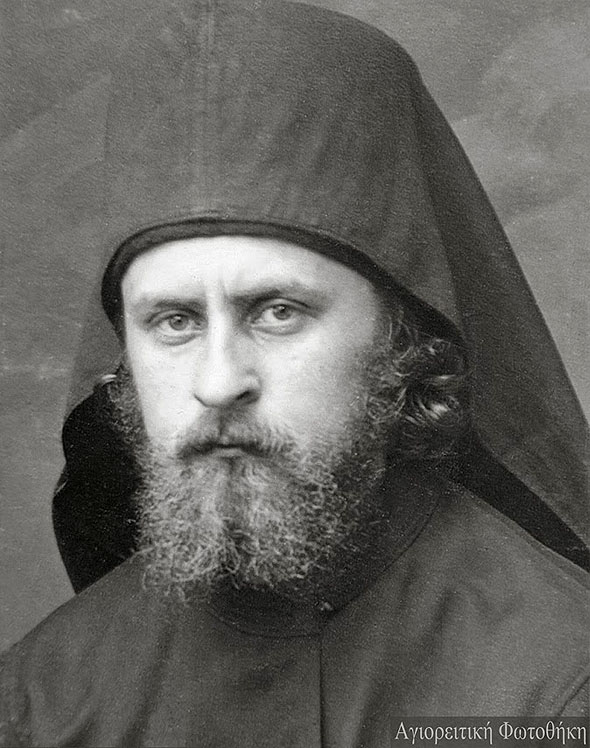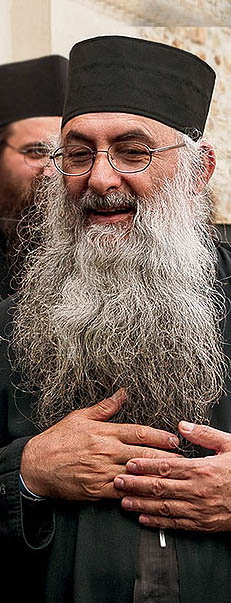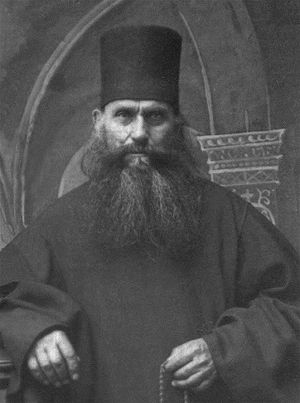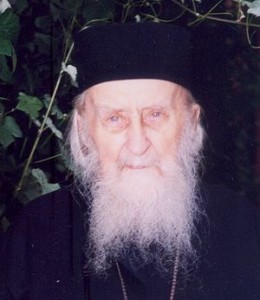2.8.14. + St. Tikhon's Orthodox Theological Seminary
Friday, 26 December 2014
The Enlargement of the Heart
"Be ye also enlarged in the Theology of Saint Silouan the Athonite and Elder Sophrony of Essex
A disciple of Elder Sophrony (of blessed memory), who was a disciple of St. Silouan the Athonite. Presently, Fr. Zacharias is a monk in the Monastery founded by Elder Sophrony: The Patriarchal Stavropegic Monastery of St. John the Baptist, Tolleshunt Knights by Maldon, Essex, England."
A talk given on February 15th 2014 at the St. John the Compassionate Orthodox Mission in Toronto
Saturday, 13 December 2014
Hieromonk Sophrony of Saint Panteleïmon (1896-1993)
He was born in Moscow in 1896 and his lay name was Sergei Symeonovich Sakharov. As he himself recalls, his first experience of the vision of the uncreated light occurred in his childhood. He studied at the School of Fine Arts in Moscow. At one stage, his religious pursuits took him into non-Christian mysticism. His artistic ambitions led him to Italy, Germany and France. He found, however, that art neither fulfilled nor enlightened him.
The spiritual heart
The heart’s the inner person, it’s the centre of our personality. Where we can encounter God, where we can make our free choice concerning Him, that’s the centre of our personality. And we can’t find our heart by our own efforts. We find our heart, because we have to say that the aim of the Christian life is for our intellect to be united with our heart. Because then we’re healed, we’re whole and we can turn to God with our whole being, fulfilling in a Godly manner the commandment where He asks us to love Him with all our heart, all our soul, all our being.
Archimandrite Zacharias (Zacharou), of the Holy Monastery of Saint John the Baptist, Essex, in an interview with Pemptousia, speaks of finding the heart, and its importance in Orthodox spiritual life.
Article published by www.pemptousia.com
Friday, 17 October 2014
Buddhism and Eastern Asceticism Compared to Orthodox Christian Asceticism
(Archimandrite Zacharias of Essex)
It is unfortunate that there is widespread confusion, not to mention delusion, in the inexperienced, whereby the Jesus Prayer is thought to be equivalent to yoga in Buddhism, or 'transcendental meditation', and other such Eastern exotica. Any similarity, however, is mostly external, and any inner convergence does not rise beyond the natural 'anatomy' of the human soul. The fundamental difference between Christianity and other beliefs and practices lies in the fact that the Jesus Prayer is based on the revelation of the One true living and personal God as Holy Trinity No other path admits any possibility of a living relationship between God and the person who prays.
“My Acquaintance with Elder Sophrony”
Metropolitan of Diocleia, Kallistos (Ware) speaks for Elder's Sophrony spirituality and his personal acquaintance with him
The mystery of man’s heart
All the ordinances of the undefiled Church are offered to the world for the sole purpose of discovering the ‘deep heart’,[1] the centre of man’s hypostasis. According to the Holy Scriptures, God has fashioned every heart in a special way, and each heart is His goal, a place wherein He desires to abide that He may manifest Himself.
Since the kingdom of God is within us,[2] the heart is the battlefield of our salvation, and all ascetic effort is aimed at cleansing it of all filthiness, and preserving it pure before the Lord. ‘Keep thy heart with all diligence; for out of it are the issues of life’, exhorts Solomon, the wise king of Israel.[3] These paths of life pass through man’s heart, and therefore the unquenchable desire of all who ceaselessly seek the Face of the living God is that their heart, once deadened by sin, may be rekindled by His grace.
The heart is the true ‘temple’ of man’s meeting with the Lord. Man’s heart ‘seeketh knowledge’[4] both intellectual and divine, and knows no rest until the Lord of glory comes and abides therein. On His part God, Who is ‘a jealous God’,[5] will not settle for a mere portion of the heart. In the Old Testament we hear His voice crying out, ‘My son, give Me thy heart’;[6] and in the New Testament He commands: ‘Thou shalt love the Lord thy God with all thy heart, and with all thy soul, and with all thy mind, and with all thy strength.’[7] He is the one Who has fashioned the heart of every man in a unique and unrepeatable way, though no heart can contain Him fully because ‘God is greater than our heart’.[8] Nevertheless, when man succeeds in turning his whole heart to God, then God Himself begets it by the incorruptible seed of His word, seals it with His wondrous Name and makes it shine with His perpetual and charismatic presence. He makes it a temple of His Divinity, a temple not made by hands, able to reflect His ‘shape’ and to hearken unto His ‘voice’ and ‘bear’ His Name.[9] In a word, man then fulfils the purpose of his life, the reason for his coming into the transient existence of this world.
Thursday, 9 October 2014
Is there spiritual life and sanctity today?
By Archimandrite Kyrillos, Abbot of the Holy Monastery of Essex
My immediate answer to both parts of this question is a very affirmative ‘Yes’. God does not change. Jesus Christ is the same, yesterday, today, and for ever. And the nature of human beings has not changed either. Since Adam, humans are dignified with such a power over their own destiny that they can to a great degree turn their backs on God, on spiritual life, on the quest for holiness. But until the end of the world, there will always be people who, even if they are in the minority, will call down God’s grace upon the earth and their fellow humans. That the world continues is proof that there is holiness today. Saint Silouan said, ‘I tell you that when there are no more men of prayer on earth, the world will come to an end.’
Saturday, 27 September 2014
St. Silouan of Mt. Athos: “I have many sorrows of my own, and they are my own fault…”
St. Silouan of Mt. AthosEveryone in life has his own battle of Stalingrad, his own cross, his own Golgotha. There are moments when it seems that circumstances are indeed beyond our power, when life breaks down and it’s painful even to look at the world around us. In such moments the soul is tormented by one question: “Why?” Reason refuses to accept reality and it languishes in bewilderment and supposition, tearing the wounded heart into pieces. Reality is cruel, and the soul can truly become sick. And no one knows when sorrows will knock at doors of the heart. But we must know in that moment how to answer these unawaited guests…
Friday, 27 June 2014
Wednesday, 7 May 2014
Поуке старца Софронија
Старац Софроније је говорио да човек не може да живи хришћански, већ може само хришћански да умре. Ако је Христос за нас пример, онда видимо да се живот задобија преко крста – из гроба и смрти. Преко крста и смрти, ми задобијамо живот испуњавајући заповести. Заповести обнављају човека, распињу у њему старог човека и васкрсавају новог. Држање заповести обнавља у нама новог човека по слици и подобију nашег Твроца – Бога.
Sunday, 27 April 2014
Humility leads to Perfect Rest in God
 |
St Silouan the Athonite and
behind him Archimandrite Sophrony
of Essex
|
"Prayer is the best of all activities for the soul. Prayer
is the path to God. Through prayer we obtain humility,
patience and every good gift...
The Lord showed great pity on me and made me
understand that I must weep all my life. Such is the way
of the Lord. And so I write now out of pity for those who
like me, are puffed up with pride, and therefore suffer. I
write that they may learn humility and find rest in God...
Only to the humble does the Lord reveal Himself in the
Holy Spirit, and if we do not humble ourselves we shall
not see God. Humility is the light in which we may behold
the Light which is God - in the words of the Psalmist:
'In thy light shall we see light' Psalm 36:9...
The humility of Christ dwells in the lowly ones - they are
glad to be the least of men. The Lord gave me understanding
of this...
Thursday, 13 March 2014
Books That Touch Your Heart and Mind (Part 17)
Sunday, 23 February 2014
Aphorisms of Elder Sophrony (Sakharov)
Archimandrite (Sakharov) Sophrony
The following words of Archimandrite Sophrony (Sakharov) were recorded by various Athonite monks.
“I am neither Greek nor Russian; I am an Athonite.”
“I have been wearing a cassock for sixty years, but whenever I meet an Orthodox Christian or any other person, I bow my head low before him.” (Thereby the Elder wished to indicate that he feels himself to be the most unworthy.)
“Theology is the content of our prayers.”
Friday, 14 February 2014
“Domestic Theology”
Archimandrite Zacharias
In a presentation centering on Christian identity, Archimandrite Zacharias, a monk of the Monastery of St. John the Baptist, Tolleshunt Knights by Maldon, Essex, England, inspired an audience of more than 100 people with what he termed "domestic theology"—that is, "simple things"—in church life that bear profound consequences. Father Zacharias, a disciple of Father Sophrony (of blessed memory) who was a disciple of St. Silouan of Mount Athos, emphasized the importance of each Christian becoming a living temple of God, but in particular, priests.
Sunday, 9 February 2014
Lord will Give You His Grace, and You will Know Him through the Holy Spirit
The Lord is love; and He commanded us to love one another and to love our enemies.
And the Holy Spirit teaches us this love.
The soul that has not come to know the Holy Spirit does not understand how it is possible to love one’s enemies, and will not receive this commandment.
But in the Lord is pity for all men, and he who would be with the Lord must love his enemies.
How may we know whether the Lord loves us or no?
Here are tokens: If you battle firmly against sin the Lord loves you.
Friday, 7 February 2014
Thursday, 6 February 2014
A Conversation with the Elder Sophrony
The abbot of the Great and Holy Monastery of Vatopedi, Archimandrite Ephraim, spoke with Elder Sophrony of blessed memory at the Holy Monastery of St. John the Baptist in Essex, England on 20 September 1992.
From this meeting, one is struck by Elder Sophrony’s spirituality and ascetic vision, and can appreciate the value of his contribution to the contemporary life of the Church.

The abbot of the Great and Holy Monastery of Vatopaidi, Archimandrite Ephraim, in the garden of the Monastery of St. John the Baptist in Essex (1992) with Elder Sophrony, among the many pilgrims who found spiritual comfort near the venerable Elder
Wednesday, 5 February 2014
Globalization and the universality of salvation in Christ
Archimandrite Zacharias (Zacharou)
Archimandrite Zacharias (Zacharou) of the Monastery of St. John the Baptist in Essex, England, in an interview with Pemptousia.com, speaks on Globalization and the universality of salvation offered by Christ's sacrifice on the cross.
Subscribe to:
Comments (Atom)












 Download
Download Direct link
Direct link
